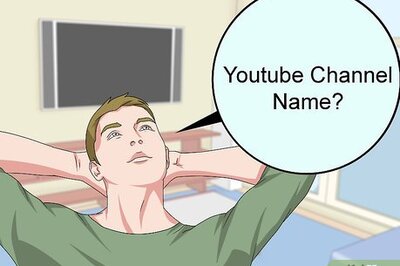
views
The central government led by Jawaharlal Nehru incorporated Article 35-A in the Constitution of India on May 14, 1954. This was done through a Presidential order, and no debate was held in Parliament.
Dr Rajinder Prasad, the then President, had reservations about the legality of this move. His letters to PM Nehru airing his misgivings were considered as gross misdemeanour by the latter. Nehru denied even a decent accommodation to Dr Prasad after he stepped down.
Nehru was a great democrat who championed the cause of true democratic processes, his supporters often say in his praises. Never mind his record vis-a-vis Rajinder Babu, vis-a-vis Shyama Prasad Mukherjee, or Praja Parishad movement of Jammu. All this and more are not topics you should discuss, according to them. Or you will be branded as someone suffering from Nehru-phobia.
The present government led by Narendra Modi removed Article 35-A from the Constitution on August 5, 2019. That day, Union Home Minister Amit Shah moved a Bill to this effect in the Rajya Sabha. The bill was passed with 125 votes for and 61 against. This means the Bill was passed by a two-thirds majority in the Upper House.
In the Lok Sabha too, on a later day, the Bill was passed with over two-thirds majority.
Modi was described by his opponents as undemocratic, dictatorial and insensitive for bringing in this Bill! The Bill changed into a law only after due debate in both the Houses of Parliament.
Was it not possible to remove this article from the Constitution of India through a Presidential Order? In the same manner in which it had been brought in, can we say, through the backdoor? That would have meant no discussions in either the Lok Sabha or the Rajya Sabha. The question is only of academic interest now but it needs to be still dissected and debated threadbare.
Those who criticised the move to abrogate Article 35-A argued that President Ram Nath Kovind showed weakness while dealing with the issue. Some of them also said that he should have refused to sign the Bill on this, despite its passage by the legislature of the nation through due process prescribed for constitutional amendment.
What did Article 35-A do when it was in existence? Well, it created two classes of Indian citizens, to begin with. Those who were Indian citizens and those who were Permanent Residents of Jammu & Kashmir, and were also citizens of India. The second variety had more rights than those who were just simply Indian citizens!
In a petition filed as early in August 2014, various provisions of Article 35-A were challenged in the Supreme Court. When this article was thrown out by the government in August 2019, five years later, it was still pending! Even now, there are some petitions pending in the Supreme Court seeking its restoration.
Those who are seeking its restoration argue that the court was delaying the hearings in the case unnecessarily. Why is it that the case for its restoration should be heard quickly for a quick decision? Why is it that it was alright when hearings on its removal continued for five years? Aren't these arguments only two sides of the same coin?
There was obviously nothing wrong when the court was proceeding ahead at its own pace when some people sought its abrogation. Now also there is apparently nothing amiss and no need for quick hearings when some people are seeking its restoration.
Article 35-A defined Permanent Residents and conferred special rights on them as respects:
(i) employment under the State government;
(ii) acquisition of immovable property in the state;
(iii) settlement in the state;
(iv) right to scholarships and such other forms as the state government may provide.
Now that this article is gone, and also the state has been downgraded to a UT with vast Ladakh UT carved out of it, there is no entity, per se, called Permanent Residents. All Indian citizens are equal in most respects in the new UT of JK which is less than seven months old. It had come out into existence on October 31, 2019, only.



















Comments
0 comment